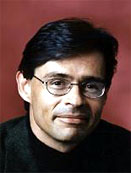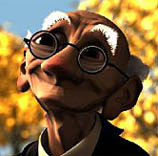|
Tony DeRose
–
computer graphics scientist
|

|
"
To me the greatest spin off (from the space program)
was to entice an entire generation of eager youngsters into
the sciences."
|

|
| |
|
|
|
| |
How were you motivated to choose your particular field? |
| |
I can't remember a time when I didn't know that I wanted to become a
scientist of some kind. In elementary school I was involved in science
every way my parents and I could think of. From reading constantly
about every aspect of science, to participating in seminars hosted by
our local community college.
In 7th grade I was fortunate to have an inspiring science teacher,
Mr. Belknap. Rather than treating my constant questions as a nuisance,
he nurtured my curiosity by spending countless hours with me after
school, helping me with projects in various scientific
disciplines. One particularly memorable project was model
rocketry. Realizing that I wanted to know how high my rockets were
going, he cleverly used the opportunity to teach me the basics of
trigonometry. Experiencing the real–world effectiveness of non–trivial
mathematics at such an early age cemented my interest in applied
math.
In college I decided to major in physics as a way to further my love
of applied math. While in college I discovered the newly emerging
field of computer graphics, and found that it too relied on applied
math. Moreover, it had two advantages over physics as a career. First,
I felt I was more likely to make a substantial contribution in a young
field such as computer graphics rather than a 400–year–old field such
as physics. Second, computer graphics by its nature is visual, meaning
that it had the potential to be appreciated by many more people than
the relatively esoteric beauty of physics.
There is a simple reason that I chose science as a career at a very
young age –– it was without question the space program. It
seems to me that the greatest spin off of the space program wasn't
Tang, Velcro, or even micro–electronics. To me the greatest spin off
was to entice an entire generation of eager youngsters into
the sciences. It saddens me that my children may not have a comparable
galvanizing endeavor to look to for inspiration. I hope the Mars
Millennium Project is a step in that direction.
|
|

|
| |
|
|
|
| |
What can you share about your creative process? |
| |

|
|
As a society we put considerable emphasis on problem solving skills.
To be sure, they are important, but I'm struck by how little emphasis
we place on developing the skills necessary to pick good problems
to work on.
As a researcher I find that I spend almost as much of my time and effort
making sure that I'm working on the right problems as I spend trying to
solve them. I constantly find myself reevaluating the importance of the
problems I'm working on. After all, there's only a small number of
problems we can work on in our careers, so its critical we choose them wisely.
I also find it helpful to work on two or three problems at a time. That
way if I get stumped on one, there's another just waiting for my attention.
Having multiple active projects also opens the door to serendipity. On
two occasions I've been delighted to discover unexpected but intimate
relationships between seemingly independent topics. Those insights led
to breakthroughs that I would not have made otherwise.
|
|
| |
|
|
|
| |
What ideas do you have for a future human community on Mars?
|
| |
One of the things that I find most stimulating in a vibrant community is
diversity. Diversity in talent (the arts should be represented in addition
to the sciences), in culture, and in age. One way to ensure diversity in
age is to have extended families in residence. That way, children as well
as seniors would be present to enrich the entire community. If I have
my way, my family will be the first to sign up!
|
|

|
|




